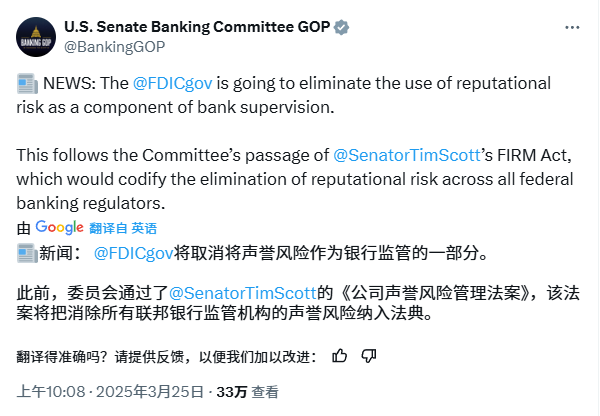
In the United States, the cryptocurrency industry has always seemed to be standing on the edge of the financial world, eager for mainstream recognition, but often blocked by an invisible wall. The name of this wall is "reputation risk". For many years, American banks have always been cautious when dealing with crypto companies, fearing that they would touch the red line of regulators. However, recently, the official account of the Republican side of the US Senate Banking Committee: The Federal Deposit Insurance Corporation (FDIC) may follow the pace of the US Office of the Comptroller of the Currency (OCC) and cancel the consideration of "reputation risk" as a factor in bank supervision. This was called "a huge victory for the crypto industry" by David Sacks, the US cryptocurrency and artificial intelligence czar. So, what is going on? What changes will it bring to the cryptocurrency industry? What does it mean for industry practitioners?
1. Reputational risk: the “tight ring” between banks and cryptocurrencies
To understand the significance of this, we need to first talk about what "reputational risk" is. Simply put, reputational risk refers to the risk that a bank's reputation may be damaged due to certain businesses or behaviors. For example, if a bank is associated with a controversial industry, customers may run away, public opinion may ferment, and even lawsuits may be brought. This risk sounds reasonable. After all, who doesn't want to protect their good reputation? But in practice, this standard becomes vague and subjective.
US regulators once defined reputation risk as: "Negative publicity about an institution's business practices (whether true or false) that may result in a loss of customers, lawsuits, or reduced revenue." You see, this definition is as broad as a basket, and anything can be put into it. The result? Regulators use this basket to dictate the business of banks. Especially in the cryptocurrency industry, reputation risk has become an invisible "tightening curse." Many banks are worried that cooperating with crypto companies will make regulators feel "risky," so they simply close the door and refuse to open accounts.
For example, big crypto companies like Coinbase have publicly complained about how difficult it is to find a bank in the United States that is willing to cooperate. Sometimes, they even have to go overseas to open an account. This phenomenon has a not-so-nice name in the industry - "Operation Chokepoint 2.0", which means to strangle the crypto industry in disguise through financial regulation.
2. Policy relaxation: a new dawn for the crypto industry?
Just when the crypto industry was struggling, things started to turn around. The Federal Deposit Insurance Corporation (FDIC) will follow the Office of the Comptroller of the Currency (OCC) and cancel the practice of using "reputational risk" as a factor in bank supervision. If this becomes an established fact, it means that in the past, banks rejected crypto companies largely because they were afraid of trouble from regulators. Now that this "trouble" is gone, banks can work with crypto companies with more confidence. Imagine if you were the boss of a crypto company, and you couldn't find a bank willing to open an account for you even if you ran around in the past. Now that the situation has changed, can you breathe a sigh of relief and focus on your business instead of asking for help everywhere?
More importantly, this is not a small move by a single institution, but a signal of the direction of financial regulation in the United States. U.S. Senator Tim Scott also proposed a bill called the Financial Institutions Risk Management Act (FIRM Act), which is to completely limit regulators from using reputational risks to pressure banks. This series of actions together make people feel that the U.S. government may be shifting from "too strict" to "giving some space", recognizing that the crypto industry is a serious economic field.
3. What the industry thinks: Sober thinking beyond cheers
The CEO of Bitwise said in an interview: "This is a great thing for us. It will be easier to cooperate with banks and reduce operating costs." Many practitioners feel that without the hurdle of "reputation risk", crypto companies can finally take a breath and concentrate on innovation and market share.
But despite the cheers, not everyone thinks everything is fine. Aiying believes that whether banks are willing to cooperate depends not only on regulatory policies, but also on their own compliance and anti-money laundering risk control capabilities. Most companies are still very weak in this area, or weakness is instinctive. After all, if they are strong, they will not be able to do a lot of business. So it is natural for banks to worry about being associated with crypto companies.
IV. Conclusion: The first step towards maturity
The FDIC's removal of "reputation risk" as a regulatory factor is a significant milestone for the crypto industry. It has removed a major obstacle to cooperation between banks and crypto companies, and has also shown that the US attitude towards crypto is quietly changing. As David Sacks said, this is a "huge victory." But victory is victory. If the crypto industry wants to truly gain a foothold, it is not enough to rely on policy relaxation alone. Technology must keep up, compliance must be done well, and public trust must be accumulated bit by bit.
There is still a long way to go, but at least now, the crypto industry has a ray of light. Perhaps in a few years, when we look back, we will find that this change is not just a small episode, but the starting point for cryptocurrency to enter mainstream finance.














